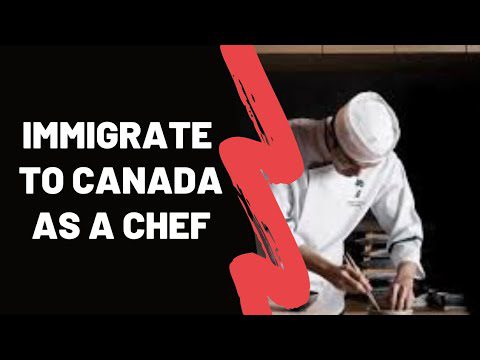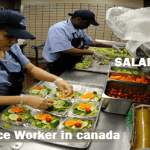Canada, known for its multiculturalism and diverse population, offers a welcoming environment for individuals from various backgrounds. As a result, the country embraces a wide range of cuisines, flavors, and dining experiences.
With people of different ethnicities residing in different provinces, there is a growing demand for talented cooks and chefs to cater to the diverse culinary preferences of Canadians.
The availability of work permits for cooks in Canada has made it an attractive career option for many individuals. The increasing popularity of Asian and Indian cuisine has contributed to the demand for skilled cooks in the country.
Employers are actively seeking qualified and suitable candidates to fill these positions and contribute to the vibrant culinary landscape of Canada.
In this context, it becomes essential for aspiring chefs and cooks to understand the eligibility requirements and application process for obtaining a work permit in Canada.
By meeting the necessary criteria and securing a job offer from a Canadian employer, individuals can embark on a fulfilling culinary journey in one of the most multicultural countries in the world.
The Application Process for a Work Permit in Canada
1. Labour Market Impact Assessment (LMIA):
Before applying for a work permit, your potential employer in Canada will typically need to obtain a positive Labour Market Impact Assessment (LMIA) from Employment and Social Development Canada (ESDC).
This process involves demonstrating that there is a genuine need for a foreign worker to fill the job and that no Canadian worker is available to do so. However, there are some cases where an LMIA is not required.
2. Work Permit Application:
Once your employer has obtained a positive LMIA, you can proceed to apply for your work permit. This application is usually done online through the official immigration website of the Government of Canada.
You will need to provide various documents, such as proof of your identity, job offer, LMIA number (if applicable), educational and professional qualifications, language proficiency, medical examination results, and security and criminal checks.
3. Application Review:
Would You Like To Apply For This Jobs/Sponsorship?
Enter Your Email Address HERE & You Will Receive a Notification About Your Application. If it shows "Subscribed" CLICK HERE to follow on Telegram for updatesAfter you have submitted your application and all the required documents, Immigration, Refugees, and Citizenship Canada (IRCC) will review your application. If any additional information or documents are needed, you will be contacted.
4. Approval and Visa Issuance:
If your application is approved, your work permit will be issued. You will need this permit, along with your visa, to enter Canada.
5. Extension of Work Permit:
If you wish to extend your stay and continue working in Canada beyond the initial duration of your work permit, you can apply for an extension. It is important to apply for an extension before your current work permit expires.
6. Work Permit Conditions:
Once you receive your work permit, it is essential to understand and comply with the conditions outlined in it. These conditions may include restrictions on the type of work you can perform, the employer you can work for, and the location where you can work.
7. Temporary Resident Visa (TRV):
In some cases, depending on your country of citizenship, you may also need to apply for a Temporary Resident Visa (TRV) or an Electronic Travel Authorization (eTA) to enter Canada. These documents are separate from the work permit and are required for entry into the country.
8. Validity Period:
Work permits in Canada have a specific validity period, which indicates how long you are authorized to work in the country. It is important to be aware of the expiry date of your work permit and make any necessary arrangements for renewal or departure from Canada before it expires.
9. Change of Employer:
If you wish to change employers while working in Canada, you will generally need to obtain a new work permit. This requires going through the LMIA process or qualifying for an LMIA exemption, depending on the circumstances.
It is important to consult the official website of the Government of Canada or seek professional advice to ensure that you have accurate and up-to-date information regarding the specific requirements and processes involved in obtaining and maintaining a work permit in Canada.
Eligibility Necessities
Eligibility requirements play a crucial role in obtaining a work permit as a chef or cook in Canada. Here are the key eligibility criteria:
- Proof of Offer of Employment: You must have a job offer from a Canadian employer in the position of a chef or cook. The offer needs to be documented, and the employer should comply with Canadian labor laws.
- NOC Code: The occupation of a chef or cook is classified under specific National Occupational Classification (NOC) codes. For cooks, it is NOC 6321, and for chefs, it is NOC 6322. Your job offer should mention the relevant NOC code.
- Educational and Professional Qualifications: You need to have the necessary educational qualifications or equivalent experience as a chef or cook. This can include apprenticeship certificates, diplomas in culinary arts, or significant years of experience in the field.
- Language Proficiency: Proficiency in English and/or French is required. Language skills are typically assessed through standardized tests such as IELTS for English or TEF for French.
- Medical Examination: A medical examination is necessary to demonstrate that you are in good health. Canada has a list of designated medical practitioners authorized to conduct this examination.
- Security and Criminal Checks: Applicants must not have any criminal records and should not pose a security risk.
It is important to note that these requirements may vary or be subject to change. It is advisable to consult official Canadian government sources or seek guidance from immigration professionals to ensure you have the most up-to-date and accurate information when applying for a work permit as a chef or cook in Canada.
Pathway to Permanent Residency
If you are considering making Canada your permanent home, there are several immigration programs that you, as a cook or chef, may be eligible for:
- Express Entry: This system assesses candidates based on factors such as their skills, work experience, language proficiency, education, and more. Cooks and chefs may qualify under the Federal Skilled Worker Program or the Canadian Experience Class.
- Provincial Nominee Program (PNP): Most provinces in Canada have their own immigration programs, which often prioritize occupations in demand within that province. If you are already working in Canada or have a job offer, you may be eligible for nomination by a specific province.
- Atlantic Immigration Pilot: This program assists employers in the Atlantic provinces in hiring foreign skilled workers who wish to immigrate to Atlantic Canada.
It is important to note that each immigration program has its own specific requirements and criteria. Meeting these requirements is crucial for obtaining permanent residency in Canada. Seeking professional advice and staying informed about the latest immigration guidelines and updates can greatly enhance your chances of success in the application process.
Conclusion
Working in Canada as a cook or chef in Canada offers numerous opportunities and the potential for permanent residency. Understanding the process and requirements for obtaining a work permit is essential.
Keeping abreast of the latest information from official Canadian government websites and seeking guidance from immigration experts can help navigate the ever-changing immigration landscape.
With the right knowledge and preparation, you can embark on a fulfilling culinary career in Canada and work towards establishing a long-term future in the country.






![[HIRING NOW] Canadian Government Jobs Available For Foreign Workers | Relocate To Canada Canadian Government Jobs Available For Foreign Workers](https://hotcampusnews.com/wp-content/uploads/2023/07/Canadian-Government-Jobs-Available-For-Foreign-Workers-150x150.png)
I am interested in the cooking job with job sponsorship
Thank you